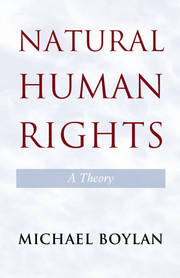Book contents
- Frontmatter
- Dedication
- Contents
- Preface
- Acknowledgments
- Part One Conceptualizing Human Rights
- Overture
- 1 How Do We Talk about Human Rights?
- 2 A Short History of Human Rights in the West
- 3 A Short History of Human Rights in China
- Part Two Justifications for Human Rights
- Part Three Applications of Human Rights
- Glossary
- Bibliography
- Index
- References
2 - A Short History of Human Rights in the West
Published online by Cambridge University Press: 05 September 2014
- Frontmatter
- Dedication
- Contents
- Preface
- Acknowledgments
- Part One Conceptualizing Human Rights
- Overture
- 1 How Do We Talk about Human Rights?
- 2 A Short History of Human Rights in the West
- 3 A Short History of Human Rights in China
- Part Two Justifications for Human Rights
- Part Three Applications of Human Rights
- Glossary
- Bibliography
- Index
- References
Summary
Why should anyone care about the history of how human rights have been recognized in the Western Tradition – or anywhere else for that matter? The answer goes to the heart of this inquiry: a theory of natural human rights. If as Charles Beitz suggests, it is the case that any useful understanding of human rights originated in 1948 with the United Nations’ Universal Declaration of Human Rights, then the legal approach set out in Part Two of this volume becomes very plausible. Others, like James Griffin, set the origins in the Enlightenment with foreshadowing in the Middle Ages. This mirrors the historical shift to the individual over against the community perspective. If the interest approach set out in Part Two of this volume is correct, then the historical transformation of attention to the individual perspective supports the sort of rights theory that the interest approach sets out. Finally, if my agency account is correct and if human agency is roughly the same throughout human history West and East, then I should be able to demonstrate background and related concepts throughout the human record on earth. To do this systematically would be a monumental task and beyond the scope of this volume. However, some important points can be sketched out with respect to the plausibility of these claims (a lower burden of proof). I address the Western tradition in this chapter and China in the next.
- Type
- Chapter
- Information
- Natural Human RightsA Theory, pp. 30 - 64Publisher: Cambridge University PressPrint publication year: 2014

